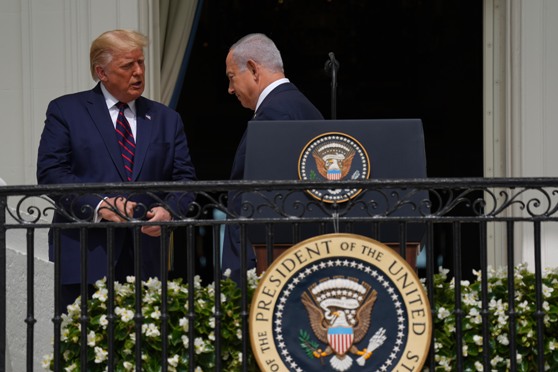Israel strikes Syria and Iranian forces as Pompeo flies in

By Isabel Kershner
JERUSALEM — Israeli forces struck Syria early Wednesday (18), a day after finding anti-personnel mines in Israeli-held territory along the boundary between the two countries and just hours before a visit by Secretary of State Mike Pompeo and his Bahraini counterpart to mark a new, US-brokered normalization deal.
Israel said the latest strikes were aimed at Syria and Iranian targets. They were part of a long-running campaign as Israel tries to thwart what it describes as a concerted effort by Iran to entrench itself on the Syrian side of the Golan Heights, a strategic plateau that overlooks northern Israel.
The foreign minister of Bahrain, Abdul Latif bin Rashid al-Zayani, landed in Israel soon after the airstrikes for the first official visit since the two countries agreed in September to normalize relations. That deal followed a similar agreement between Israel and Bahrain’s Gulf neighbor, the United Arab Emirates.
Pompeo arrived later Wednesday and was expected to attend a trilateral meeting in Jerusalem of Israeli, Bahraini and American officials.
Al-Zayani and Israel’s foreign minister, Gabi Ashkenazi, said they had agreed to open embassies in each other’s countries as soon as possible.
“We addressed the importance of regional stability, as well as the need to combat terrorism and extremism and to build in its place a culture of dialogue and understanding,” al-Zayani said at a joint news conference after their meeting.
He added that he had invited Ashkenazi to attend next month’s Manama Dialogue, a meeting in Bahrain on regional and international security cooperation.
“Developments like today’s visit, which would have appeared impossible only a few months ago, now seem to happen almost weekly,” al-Zayani added.
The normalization deals were struck in the waning days of the Trump administration to notch final foreign policy achievements just before the Nov. 3 US election. But after the victory of the Democratic challenger, Joe Biden, Pompeo has embarked on a last-minute lap of diplomacy.
The alliance between Israel and the Persian Gulf states has largely been based on their shared interest in countering Iran, their common archnemesis. Regional powers now appear to be jostling for position amid worries that a Biden administration will be softer on Iran and seek to rejoin the international nuclear deal with Iran from which President Donald Trump withdrew two years ago.
Prime Minister Benjamin Netanyahu of Israel has long rejected the deal, which was meant to curb Iran’s nuclear ambitions, saying it was inadequate and dangerous.
In what analysts view as an effort to pre-empt, complicate or narrow Biden’s options, Trump is racing to increase US sanctions against Iran during his last weeks in office and to seal his pledge to sell advanced weapons to Tehran’s regional enemies, including F-35 stealth fighter jets to the United Arab Emirates.
The recent exposure of the assassination this summer of al-Qaida’s No. 2 in a Tehran suburb by Israeli agents working at the behest of the United States could also make it harder for Biden to manoeuvre. Trump is even said to have considered a strike on Iran’s nuclear facilities before leaving office, but was talked out of it to avoid the risk of a broader conflagration.
The Trump administration has benefited Israel as well as its Persian Gulf allies. Overturning decades of American diplomacy, Trump recognized Israeli sovereignty over the Israeli-controlled portion of the Golan Heights, captured from Syria in the 1967 war.
The United States under Trump also recognized Jerusalem as Israel’s capital, despite Palestinian claims to the eastern portion of the city, and it declared that it no longer considered Israeli settlements in the West Bank as necessarily a violation of international law, defying international consensus.
It is possible that Pompeo will visit both the Golan Heights and an Israeli settlement in the occupied West Bank before leaving Israel on Friday, flouting longstanding diplomatic convention, though American officials have so far refused to confirm any details of his itinerary.
The latest events along the Golan frontier highlighted how volatile conditions there have become, with Israel directly engaging with Iranian forces, who have intervened in Syria’s civil war, several times in recent years.
The anti-personnel mines were planted sometime in the last few weeks by local Syrian operatives acting under the guidance of the Quds Force, the branch of Iran’s Revolutionary Guard that is responsible for foreign operations, according to Lt. Col. Jonathan Conricus, a spokesman for the Israeli military.
The explosive devices were found on Tuesday, he said, in almost the same spot where Israeli troops ambushed four militants as they planted bombs in early August and close to an Israeli military position. That previous time, Israel carried out airstrikes against targets in southern Syria belonging to the Syrian military.
“Obviously, the message didn’t sink in,” Conricus said Wednesday, adding, “Hopefully this time Iranians and the Syrians will understand the situation.”
Before dawn on Wednesday, Israel struck about eight targets ranging from the border area to the outskirts of Damascus, the Syrian capital. They included a facility that hosts senior Iranian delegations in Syria, a Syrian army base used by the Quds Force, and advanced surface-to-air missile batteries after they fired at Israeli aircraft, according to the Israeli military.
Syria’s state-run news agency, SANA, cited an unnamed military source as saying that three soldiers had been killed and a fourth wounded in the Israeli strikes, and that Syrian air defences had downed some of the Israeli missiles.
-New York Times

